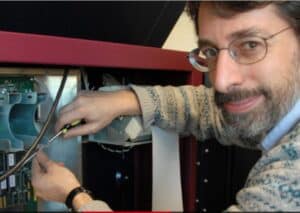When it comes to the redistricting process, Republicans won where it mattered. GOP victories in state level elections could really pay off, as it’s yet to be seen what will happen with the current chaotic presidential election race.
The census happens every 10 years and with that, districts are redrawn on the map to account for population changes. Gerrymandering is a tactic used by whoever is in power to redraw the maps to favor their party. This is where things went very well for Republicans as they are now able to redistrict 188 congressional seats which accounts for 43 percent of the entire House of Representatives. Democrats will only control around 17 percent.
See the map below posted by FiveThiryEight

How did Republicans pull that off? By winning almost every 2020 election in which control of redistricting was at stake:
The GOP kept control of the redistricting process in Texas by holding the state House. Given that Election Data Services estimates Texas will have 39 congressional seats for the next decade, this was arguably Republicans’ single biggest win of the 2020 election.
Republicans successfully defended the Pennsylvania legislature from a Democratic takeover, although they’ll still need to share redistricting power over its projected 17 congressional districts, as Democratic Gov. Tom Wolf has veto power.
Republicans held the majority in both chambers of the North Carolina legislature, which will enable them to draw an expected 14 congressional districts all by themselves.
Amendment 1 passed in Virginia, taking the power to draw the state’s 11 congressional districts out of the hands of the all-Democratic state government and investing it in a bipartisan commission made up of a mix of citizens and legislators.
In Missouri (home to eight congressional districts), Gov. Mike Parson was elected to a second term, keeping redistricting control in Republican hands.
In an upset, Republicans managed to keep their majority in the Minnesota state Senate, thus ensuring Democrats wouldn’t have the unfettered ability to draw the state’s projected seven congressional districts. The parties will share redistricting responsibilities there.
The GOP kept control of the state House in Iowa, with its four congressional districts.
Republicans maintained their supermajorities in the Kansas Legislature, enabling them to pass a new congressional map (worth four districts) over Democratic Gov. Laura Kelly’s veto.
Finally, Republicans surprisingly flipped both the state Senate and state House in New Hampshire (worth two congressional districts), seizing full control of both the state government and the redistricting process.
The one state where Republicans may not have gotten their preferred outcome is New York, where we still don’t know who will control the redistricting process because the state is taking so long to count absentee ballots. If Democrats win a supermajority in the state Senate, they will have total veto power over the state’s projected 26 congressional districts. Democrats are close to clearing that bar, but we won’t know if they make it for, potentially, weeks.
Only time will tell what will happen when it comes to redistricting, especially with such a contentious race and elections in multiple states still being contested.
Full story at FiveThirtyEight.
Can You Hack an Election in 7 Minutes?
Can an election be hacked in seven minutes?
Andrew Appel, a professor at Princeton University set out to do just that, hack into a voting machine. In order to do this he could have tried traditional ways of hacking or writing malware to sneak on to a machine at a polling place that are left unguarded for days, but he decided it was much easier to just buy one online.
For the cost of a whole $82, Appel became the proud owner of a behemoth machine called Sequoia AVC Advantage. This machine is one of the oldest and most vulnerable in the US and is unfortunately used in places like Louisiana, New Jersey, Virginia and Pennsylvania.
No sooner did a team of bewildered deliverymen roll the 250-pound device into a conference room near Appel’s cramped, third-floor office than the professor set to work. He summoned a graduate student named Alex Halderman, who could pick the machine’s lock in seven seconds.
Clutching a screwdriver, he deftly wedged out the four ROM chips—they weren’t soldered into the circuit board, as sense might dictate—making it simple to replace them with one of his own: A version of modified firmware that could throw off the machine’s results, subtly altering the tally of votes, never to betray a hint to the voter. The attack was concluded in minutes.
To mark the achievement, his student snapped a photo of Appel—oblong features, messy black locks and a salt-and-pepper beard—grinning for the camera, fists still on the circuit board, as if to look directly into the eyes of the American taxpayer: Don’t look at me—you’re the one who paid for this thing.

Appel’s mischief might be called an occupational asset: He is part of a diligent corps of so-called cyber-academics—professors who have spent the past decade serving their country by relentlessly hacking it.
Electronic voting machines—particularly a design called Direct Recording Electronic, or DRE’s—took off in 2002, in the wake of Bush v. Gore. For the ensuing 15 years, Appel and his colleagues have deployed every manner of stunt to convince the public that the system is pervasively unsecure and vulnerable.
Beginning in the late ’90s, Appel and his colleague, Ed Felten, a pioneer in computer engineering now serving in the White House Office of Science and Technology Policy, marsha led their Princeton students together at the Center for Information Technology Policy (where Felten is still director).
There, they relentlessly hacked one voting machine after another, transforming the center into a kind of Hall of Fame for tech mediocrity: reprogramming one popular machine to play Pac-Man; infecting popular models with self-duplicating malware; discovering keys to voting machine locks that could be ordered on eBay.
Eventually, the work of the professors and Ph.D. students grew into a singular conviction: It was only a matter of time, they feared, before a national election—an irresistible target—would invite an attempt at a coordinated cyberattack.
There is no singular national body that regulates the security or even execution of what happens on Election Day, and there never has been. It’s a process regulated state by state.
The Princeton group has a simple message: That the machines that Americans use at the polls are less secure than the iPhones they use to navigate their way there. They’ve seen the skeletons of code inside electronic voting’s digital closet, and they’ve mastered the equipment’s vulnerabilities perhaps better than anyone (a contention the voting machine companies contest, of course).
They insist the elections could be vulnerable at myriad strike points, among them the software that aggregates the precinct vote totals, and the voter registration rolls that are increasingly digitized. But the threat, the cyber experts say, starts with the machines that tally the votes and crucially keep a record of them—or, in some cases, don’t.
Cleary hacking into voting machines is an easy task, which is a major concern for our democracy. If powerful people with money and resources want to stay in control, we now know they can make that happen very easily.
Charlie Kirk Discusses Rudy Giuliani's Bold Prediction Stating "The Election Will Be Overturned"
During Charlie Kirk’s show, he breaks down how Rudy Giuliani says the election will be overturned.
In the first video clip that Kirk plays, Giuliani says “you want to get down to the votes, lets just pick Pennsylvania, we have identified 632,000 illegal votes, 632,000! It’s enough to have the president win the state by 300,000, which is actually what he won it by if you get that smartmatic machine out.”
Giuliani continued “They are counting mail-in ballots and they don’t allow any Republican to inspect, that is illegal, unlawful, against the law, I don’t know how else to put it.”
Kirk then refers to another clip where they describe how Smartmatic has a backdoor where you can see how many votes are needed to gain an electoral advantage. Kirk explains that it is consistent with what Lt. Gen. Tom McInerney and Trump attorney Sidney Powell have been saying.
Giuliani says that he can prove with witnesses that the backdoor was used in Michigan and that they are investigating the rest of the states they believe to have issues. He said with illegal ballots alone they have enough to overturn the state.
Kirk went on to say “I love Rudy, he is a dear friend” he went on to say how involved he is, “no matter what it is, it’s the laptop, Rudy’s there, impeachment, Rudy’s there, going after the president, Rudy’s there, Smartmatic, Rudy’s there. No matter what it is, he has lived the most interesting full life of any political operative I’ve ever seen in the last decade.”
In a final clip that Kirk plays, Giuliani explains that they have people and proof that they can’t disclose yet that will lead to the election being overturned.
See the full clip from the show below.










